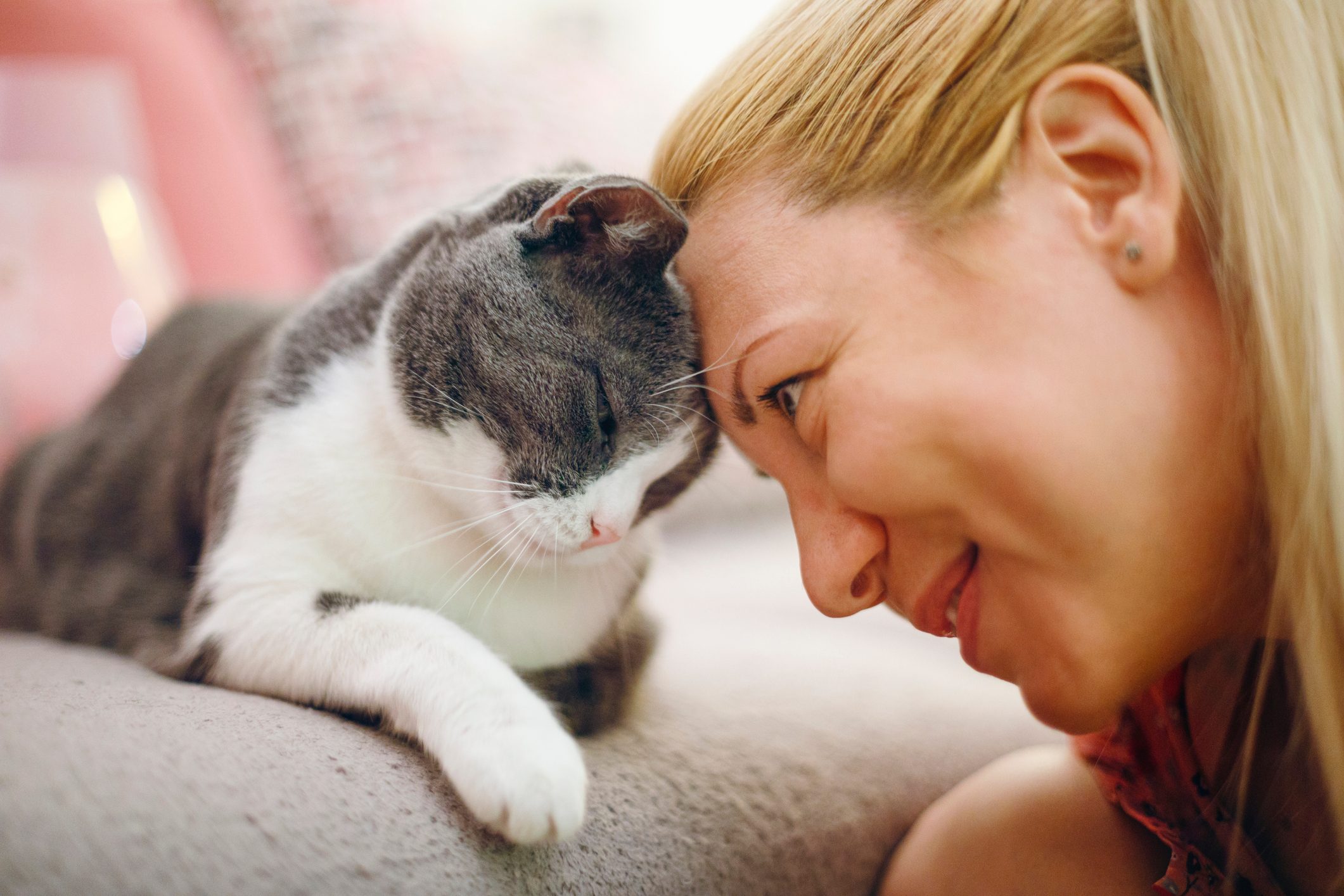Cats are more likely to respond and socialize when spoken to in a soft and calm voice, according to studies. Cats can understand their names and come when called, and they may even respond positively to baby talk.

Credit: www.facebook.com
Why Do Cats Respond To Baby Talk?
Talking to your cat in a high-pitched, sing-song voice might feel silly to you, but your feline friend actually enjoys it. Surprisingly, studies have shown that cats are more likely to respond to their owners when they talk to them in baby talk. So why exactly do cats respond to baby talk?
Studies On Cats’ Response To Baby Talk
Research has found that cats are highly receptive to the sound of human voices, especially higher-pitched, exaggerated speech. One study published in the journal Current Biology found that cats preferred infant-directed speech over adult-directed speech. In fact, they responded more positively to baby talk, characterized by a higher pitch, slower tempo, and exaggerated intonation.
Positive Reactions To Baby Talk
When owners talk to their cats using baby talk, it often elicits positive reactions from them. Cats may respond by walking towards their owners, purring, rubbing against them, and even meowing back. Baby talk seems to capture their attention and engage their curiosity, making them more likely to interact with their owners.
Cats’ Preference For Baby Talk
It is believed that cats’ preference for baby talk stems from their instinctual responses to certain vocalizations. Baby talk mimics the melodic and gentle tones that kittens hear from their mothers. When cats hear their owners using baby talk, it may remind them of their early bonding experiences and create a sense of comfort and security.
In addition, baby talk often involves repetitive and rhythmic patterns, which are similar to the vocalizations that cats use to communicate with each other. This makes it easier for cats to understand and process the message conveyed through baby talk.
So the next time you find yourself talking to your cat in a high-pitched, baby voice, embrace it! Your feline friend appreciates the attention and connection that comes with baby talk.

Credit: www.rd.com
Do Cats Recognize Human Speech?
Cats can recognize human speech and often respond positively when spoken to in a soft and calm voice. Studies have even suggested that cats are more likely to respond to their owners when they talk to them in baby talk.
So, go ahead and have a conversation with your feline friend!
Differentiating Cat-directed Speech And Human-to-human Speech
When it comes to communicating with our feline friends, it’s important to understand that cats have their own unique ways of perceiving and responding to speech. One interesting aspect is the differentiation between cat-directed speech and human-to-human speech. Cat-directed speech, also known as “baby talk” or “kitty voice,” refers to the high-pitched and melodic tone that people often adopt when talking to their cats. This type of speech is characterized by exaggerated intonation and elongation of vowels, similar to how we speak to infants. When using cat-directed speech, we tend to mimic the sounds that cats themselves produce, such as purrs and meows. In contrast, human-to-human speech is our normal way of communicating with each other—a more conversational, relaxed, and even-toned approach. This type of speech is typically less melodic and lacks the rising and falling pitch patterns that are common in cat-directed speech.Lack Of Response To Stranger’s Voice
Interestingly, cats seem to have the ability to differentiate between these two types of speech and respond differently to each. Research has shown that cats are more likely to respond to cat-directed speech from their owners and show little to no response when hearing human-to-human speech or the voice of a stranger. Cats have a unique bond with their owners and are highly attuned to their voices and familiar sounds. They can recognize the individual tone, pitch, and cadence of their owners’ voices, which can evoke a positive response and indicate that they are being addressed directly. On the other hand, the voices of strangers or unfamiliar tones may not elicit the same level of recognition or response from cats.Recognizing Their Owners’ Voice
It’s fascinating to discover that cats can actually discern and recognize their owners’ voices amidst a sea of other sounds. This recognition suggests that cats not only process the auditory information but also associate it with their specific owners. When you talk to your cat using their name or using a soft and calm tone, they are more likely to respond and engage with you. This interactive communication helps to strengthen the bond between you and your furry companion. In conclusion, while cats may not understand the exact meaning of our words, they are certainly capable of recognizing and responding to our voices. So go ahead and continue talking to your cat – they may not respond like a human would, but they appreciate the attention and the special bond that develops through communication.Can Cats Understand Meowing?
Studies have suggested that cats are more likely to respond to their owners when spoken to in a soft and calm voice, even in baby talk. Talking to your cat can help form a bond with them and they may even meow back in response.
Cats are social beings that crave attention, so they do enjoy when you talk to them.
es! Cats do like it when you talk to them, and it can actually have several benefits for both you and your furry friend. One common question that often arises is whether cats can understand human meowing. Let’s dive into this fascinating topic to explore the different aspects of cat communication.Lack Of Meaning In Human Meows
When it comes to meowing, cats have their own unique way of communicating with each other and with us. While human meows may sound playful or endearing to us, they lack meaning in the feline world. Cats rely on body language, vocalizations, and scent to convey their messages to other cats. It’s important to remember that cats meow primarily to communicate with humans, not with each other. Mother cats use meows to communicate with their kittens, but as cats grow older, meowing is mostly reserved for interacting with humans.Possible Attention And Appreciation
Despite the lack of meaning in human meows, your cat may still respond to your attempts to communicate with them. Cats are highly perceptive and can pick up on your tone of voice and body language. When you talk to your cat, they may see it as an opportunity for attention and appreciate the interaction. Cats are known to be social animals, and talking to them can help strengthen your bond. They may purr, rub against you, or even meow back in response to your voice. It’s a way for them to show their love and affection while also enjoying your company.Human Meows As Human Language
While cats may not understand the meaning behind human meows, they can recognize that it’s a form of communication from you. They can pick up on the intonation and emotions in your voice, which can help them understand your intentions. It’s important to note that cats are more likely to respond positively to soft and calm voices. Speaking to your cat in a soothing tone can help them feel safe and comfortable. Avoid using loud or harsh tones, as this can cause anxiety or stress for your feline companion. In conclusion, cats may not understand human meows in the same way they understand their own vocalizations, but they can still appreciate and respond to your attempts to communicate. Talking to your cat in a soft, loving voice can help strengthen your bond and provide a sense of companionship. So go ahead and have a chat with your feline friend – they’ll likely enjoy the attention and affection!Benefits Of Talking To Cats
When it comes to talking to cats, they actually enjoy it! Cats like being spoken to in a soft and calm voice and are more likely to respond and socialize when they feel safe and comfortable. So go ahead and have a conversation with your feline friend!
Bonding With Your Cat
When it comes to forming a strong bond with your feline friend, talking to them can be surprisingly beneficial. Cats are known to be sensitive and responsive to the tone and cadence of your voice. So, even if it might seem a bit silly, using a soft and calm voice when addressing your cat can actually make a big difference in how they perceive and respond to you. By regularly engaging in conversation with your kitty, you are creating a sense of familiarity and trust. This can help your cat feel more comfortable around you, leading to a stronger bond. Just like humans, cats thrive on social interaction and the sound of your voice can make them feel safe and loved.Forming A Social Connection
Talking to your cat not only strengthens the bond between you two, but it also helps to form a social connection. Cats are intelligent animals and they can understand a lot more than we give them credit for. They may not understand every word you say, but they can pick up on the affection and warmth in your voice. When your cat hears you talking to them, they recognize that you are engaging with them and showing interest in their presence. This makes them feel valued and acknowledged, contributing to their overall well-being. So, don’t hesitate to strike up a conversation with your furry companion – they’ll appreciate the effort and respond positively.Showing Love And Attention
One of the primary benefits of talking to your cat is that it allows you to express love and attention. Cats are creatures that thrive on love and affection, and talking to them is one of the simplest ways to convey your feelings. It’s like having a heart-to-heart conversation with your furry friend. When you talk to your cat, you are communicating your care and concern for them. Whether it’s praising them for their antics, comforting them during stressful times, or simply sharing your day with them, your words contribute to their overall happiness. They may not respond with words, but their purrs, twitches, and cuddles speak volumes about their appreciation for your attention. So, go ahead and have a chat with your cat. It’s a great way to bond with them, form a social connection, and show them just how much you love and care for them. ### Conclusion In conclusion, talking to your cat has numerous benefits, including strengthening the bond, forming a social connection, and showing love and attention. Remember, when you talk to your cat, use a soft and calm voice to make them feel safe and valued. So, don’t hesitate to engage in conversation with your feline friend – they’ll appreciate it more than you know!
Credit: www.facebook.com
Frequently Asked Questions Of Do Cats Like It When You Talk To Them
What Do Cats Think When You Talk To Them?
Cats are sensitive to the tone of your voice. They are more likely to respond and socialize when spoken to in a soft and calm voice. They can also learn to understand their names and come when called. Cats may even respond to baby talk from their owners.
Do Cats Like It When You Talk To Them Like A Baby?
Cats are more likely to respond and socialize when you talk to them in a soft and calm voice. Studies suggest that using baby talk with cats can have positive effects, such as the cat walking to the owner or meowing back.
So, yes, cats do like it when you talk to them like a baby.
Do Cats Know When Were Talking To Them?
Cats can recognize when we talk to them. They respond well to soft and calm voices and can even learn to understand their names. Some studies suggest that cats are more likely to respond to their owners when talked to in baby talk.
However, they don’t understand or respond to human meows. Talking to your cat can help form a bond and show them love and attention.
Conclusion
Overall, cats do enjoy it when you talk to them. While they may not understand the words you’re saying, they are sensitive to the tone and loudness of your voice. Speaking to them in a soft and calm voice can help them feel safe and more inclined to socialize with you.
Research also suggests that cats are more likely to respond to their owners when they use baby talk. So go ahead, have a conversation with your furry friend – they’ll appreciate it!



